|
|
|
Sort Order |
|
|
|
Items / Page
|
|
|
|
|
|
|
| Srl | Item |
| 1 |
ID:
102552
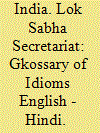

|
|
|
|
|
| Publication |
New Delhi, Lok Sabha Secretariat, 1997.
|
| Description |
v, 174p.
|
|
|
|
|
|
|
|
|
|
|
|
Copies: C:1/I:0,R:1,Q:0
Circulation
| Accession# | Call# | Current Location | Status | Policy | Location |
| 055674 | 423.1/IND 055674 | Main | On Shelf | Reference books | |
|
|
|
|
| 2 |
ID:
149091
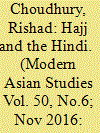

|
|
|
|
|
| Summary/Abstract |
This article charts several historical paths, hitherto underexplored, through the Hindi or ‘Indian’ Sufi lodges of the Ottoman empire. Focusing on the ‘long eighteenth century (circa 1695–1808)’, it tracks their remarkable ascendance as an institutional network for mobile and migrant Indian Sufi pilgrims. From Istanbul to the provinces, the article demonstrates how Naqshbandis and Qadiris on the Hajj circuit drew on local channels of social communications, legal petitioning strategies, and state and inter-state linkages to forge unique identities as ‘trans-imperial subjects’ in an age of decentralization in the Ottoman world. I argue that central to their social success was the creation of new corporate regimes of itinerant piety. But first, I place the little-known lodges at the heart of a specific shift in early modern attitudes to identity, as the story behind ‘Hindi’ beckons wider inquiry into emergent differences among Sufi pilgrims in the Ottoman empire.
|
|
|
|
|
|
|
|
|
|
|
|
|
|
|
|
| 3 |
ID:
142382
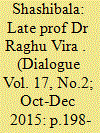

|
|
|
| 4 |
ID:
175481
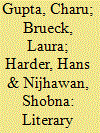

|
|
|
|
|
| Summary/Abstract |
This collection brings together nine essays, accompanied by nine short translations, that redraw the boundaries of literary histories both temporally and spatially. The essays, rooted in the humanities and informed by interdisciplinary area studies, explore multiple linkages between forms of print culture, linguistic identities and diverse vernacular literary spaces in colonial and post-colonial South Asia. The essays and translations foreground complex and politicised expressions of gender and genre in fictional and non-fictional print materials and thus draw meaningful connections between the vernacular and literature, the everyday and the marginals, and gender and sentiment. Collectively, they expand vernacular literary archives, canons and genealogies, and push us to theorise the nature of writing in South Asia.
|
|
|
|
|
|
|
|
|
|
|
|
|
|
|
|
| 5 |
ID:
126144
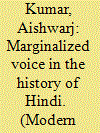

|
|
|
|
|
| Publication |
2013.
|
| Summary/Abstract |
This paper examines the history of 'Hindi'1 as a modern Indian language in Bihar between 1850 and 1900. It looks beyond the North-Western Provinces, hitherto the focus of most studies of Hindi, and issues that were important here but not in Bihar like, for example, the 'Hindi'-Urdu conflict. Instead, it looks at how the ways in which the history of 'Hindi' unfolded in Bihar and was distinct from that in other parts of North India. It demonstrates how the regional languages of Bihar were more crucial to the development of 'Hindi' in this region than standardized 'Hindi', at least until the early twentieth century. A prime focus in this paper is Sir George Abraham Grierson who postulated the theory of an independent 'Bihari' language and collected materials to support it. These materials reflect the continuing popularity of Bihari cultural traditions throughout the nineteenth century despite the avowed support for a standardized 'Hindi' by the colonial government and the intelligentsia of Bihar. They add a dimension to the historical development of 'Hindi' that was distinctive to Bihar. Focussing on this, this paper stresses the part played in the history of 'Hindi' by an agent whose voice was marginalized and later ignored or suppressed in canonical accounts of its development as a modern Indian language.
|
|
|
|
|
|
|
|
|
|
|
|
|
|
|
|
| 6 |
ID:
175483
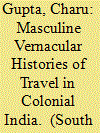

|
|
|
|
|
| Summary/Abstract |
This article focuses on vernacular travel writings on America and Europe by Swami Satyadev ‘Parivrajak’ (1879–1961), one of the first persons to systematically write travelogues in Hindi. I argue that Parivrajak’s travel literature was part of a colonised nation’s attempt to reclaim a space of freedom, forged through the carving of ‘perfect masculine bodies’, which embodied his ideals of beauty and pleasure. It was a performative, political act that inscribed gendered landscapes with a dialogue between East and West, slavery and freedom. The Hindu male’s subaltern masculinity had to be overcome through diverse means, all of which metaphorically interacted to shape Parivrajak’s writings.
|
|
|
|
|
|
|
|
|
|
|
|
|
|
|
|
| 7 |
ID:
141664
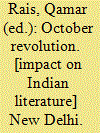

|
|
|
|
|
| Publication |
New Delhi, Sterling Publishers Pvt Ltd, 1978.
|
| Description |
xiii, 136p.pbk
|
|
|
|
|
|
|
|
|
|
|
|
Copies: C:1/I:0,R:0,Q:0
Circulation
| Accession# | Call# | Current Location | Status | Policy | Location |
| 017424 | 947.0841/RAI 017424 | Main | On Shelf | General | |
|
|
|
|
| 8 |
ID:
146877
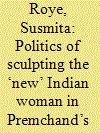

|
|
|
|
|
| Summary/Abstract |
This article focuses on two short stories by Munshi Premchand (1880–1936), a stalwart in modern Hindi literature. The aim is to counter the growing amnesia among the general readership about Premchand’s phenomenal contribution to India’s nationalist literature and to challenge the prevailing over-simplistic analysis of his depiction of Indian and Western womanhood. It is widely understood that Premchand, as a traditionalist and nationalist, eulogised Indian womanhood, often by denigrating Western women and their ideals. Re-examining the binary between the memsahib stereotype and the Indian woman (Bharatiya nari) image, this article takes an untrodden route. Casting new light on the text, it attempts to overturn the binary model that almost all critics so far have created about Premchand’s depiction of memsahibs versus Indian women.
|
|
|
|
|
|
|
|
|
|
|
|
|
|
|
|
| 9 |
ID:
093267
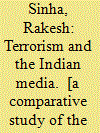

|
|
|
|
|
| Publication |
New Delhi, India Policy Foundation, 2009.
|
| Description |
xvii, 163p.
|
|
|
|
|
|
|
|
|
|
|
|
Copies: C:1/I:0,R:0,Q:0
Circulation
| Accession# | Call# | Current Location | Status | Policy | Location |
| 054682 | 363.325/SIN 054682 | Main | On Shelf | General | |
|
|
|
|
| 10 |
ID:
177195
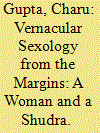

|
|
|
|
|
| Summary/Abstract |
This article centres on the Hindi sexology writings of a woman, Yashoda Devi, and a Shudra, Santram B.A. In the context of an efflorescence of vernacular sexology literature in early twentieth-century North India, it explicates how their writings moved along different registers, whereby they envisaged a heterosexual ethics that relied on utopian and dystopian descriptions of modernity. Sexology in Hindi, particularly when construed from the margins, reified, constructed, destabilised and questioned sexual norms. The article argues that while largely operating within reformist sexology frames, their writings at times punctured dominant upper-caste, male-centric authority and created frictions in normative equations. Together, their writings contribute significantly to creating a vernacular archive of sexual sciences in India.
|
|
|
|
|
|
|
|
|
|
|
|
|
|
|
|
|
|
|
|
|